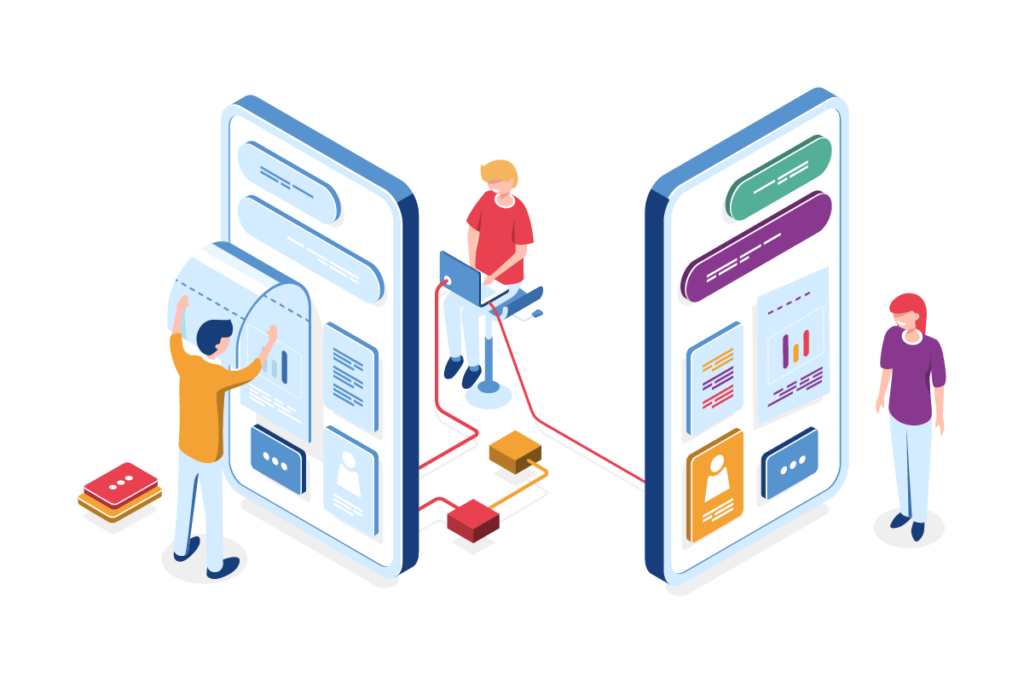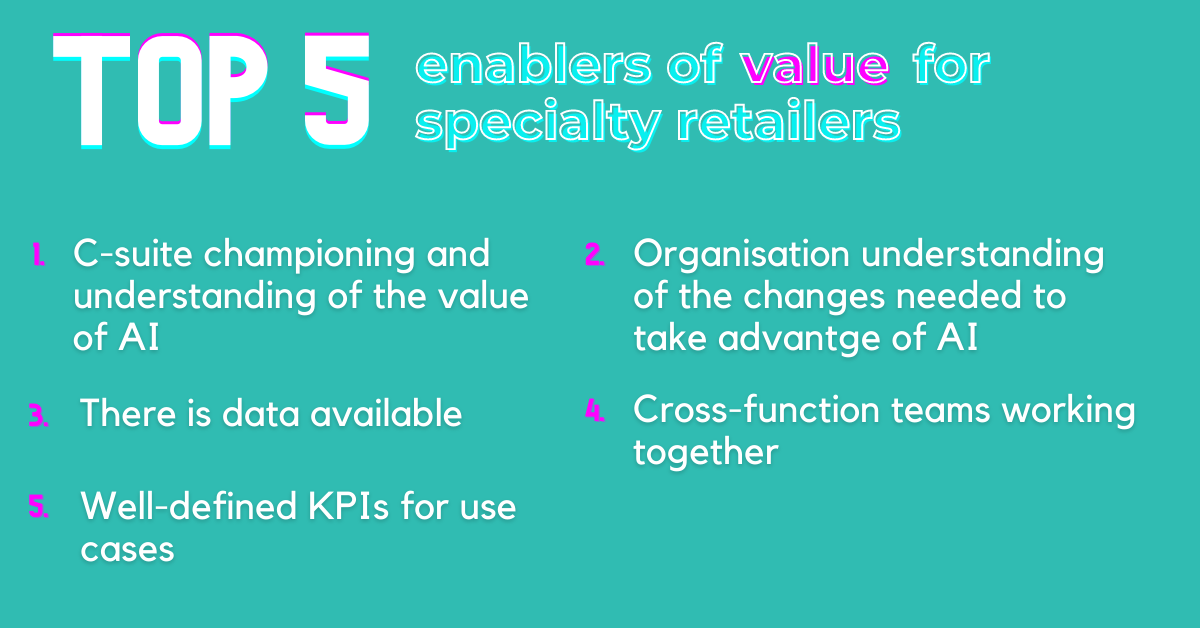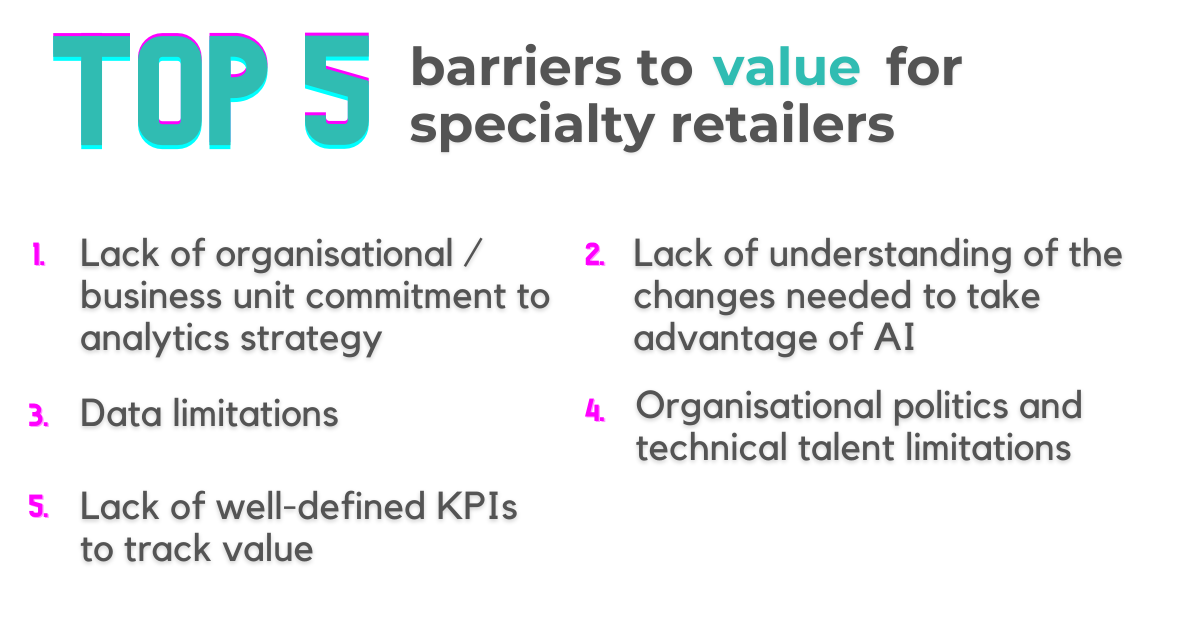Reduced in-store visits amplified by Covid-19 have increased demand. With this, retailers are realising (if they hadn’t before 2020) that a highly personalised experience is essential to establishing and maintaining their customer loyalty online through recommendations ai.
Within several months, the global pandemic not only amplified differences between retail leaders and laggards, but seriously condensed the timeline available to play ‘catch up’ in digital transformation and e-commerce.
Retailers of all sizes need to be one step ahead of their customers’ needs and their competitors’ next innovation, requiring agility, adaptability and a digital transformation mindset. Adoption of AI is the backbone of digital transformation.
E-commerce specialists can rest a little easier though, with the ever-evolving opportunities and automation of recommendations engines to drive transformation with recommendations ai.
How do recommendations ai think they know what I want?
In basic terms, recommendation systems are a set of algorithms that give you recommendations based on your history. Common examples of where you have seen a recommendation system in action would be eBay or Amazon – you would see similar products displayed under the particular product you have chosen to explore.
This isn’t a new discussion or retail strategy though – a study in 2017 by Boston Consulting Ground found, “Brands that create personalized experiences by integrating advanced digital technologies and proprietary data for customers are seeing revenue increase by 6% to 10% — two to three times faster than those who don’t.”

The future of recommendations ai
So that’s basic AI – advanced AI recommendation algorithms are much further along than that and can look into demographic data, social media impressions and digital footprints of consumers to decode their interests.
In January 2021, Google announced the launch of a whole suite of solutions designed to support retailers enhance their e-commerce capabilities and deliver personalised consumer experiences. One of these is Google’s Recommendations AI, which is now out of beta.
Google’s Recommendations AI (or Recs AI) is a sophisticated analysis tool created specifically to inform users in delivering personalised recommendations to customers.
This technology shifts the emphasis from specific product recommendations to the individual and how their viewing history informs their purchasing decisions, says Google Product Manager Pallav Mehta.
Its context-hungry deep learning models use item and user metadata to draw insights across millions of items at scale and constantly iterate on those insights in real time in a way that is impossible for manually curated rules to keep up with.
Recommendations AI draws on years of experience in delivering user-specific content across Google Ads, Google Search and YouTube. Data is drawn from the retailer’s catalog and Google Cloud services such as Google Tag Manager, Google Analytics 360, Cloud Storage, Big Query and Merchant Centre. With a capacity to support catalogues of tens of millions of items, models are based on the objective; engagement, revenue or conversions.
New models can be developed within two to five days depending upon the complexity and are previewed prior to publishing. Existing models can be re-trained daily to capture changing catalogues, items with sparse data and user insights. Since Google began trialling the technology, users have reported an increase in online revenue.
So there is value and reward for both the brand and their customer?
Absolutely. Personalised product recommendations using AI/ML can improve customer omni-channel experiences by providing individualised product suggestions and other communications (e.g. online and in-store messaging) – not only to a given customer but also to specific moments within a customer/shopping journey.
Highly relevant recommendations can be powerful drivers of basket expansion and increased order value for a brand – and they can also lead to an enhanced customer experience as well. Shopper loyalty increases when trust grows that recommendations reflect personal taste and enable discovery of new products.
Tom Sowerby, XPON’s Head of Cloud and Martech, says,
Providing timely recommendations to customers is a big step in the right direction, but the real value comes when you train these models based on a full set of customer data from both online and offline behaviour. Leveraging all the data you hold in a way that’s useful to your customers is the difference between an okay customer experience and a great one.
Value: Recognised or Blocked?
What makes a retailer more likely to succeed in capturing value from AI / ML?
Based on Google Cloud’s research, there are 5 key factors that retailers have identified as the top enablers for success. Together, these factors lead to approximately 60% of the value capture.

And if there is a top five enablers of value, there has to be be a top five about what makes a retailer less likely to succeed in capturing value from the use cases around AI and ML.
Google’s research found that there were 5 key barriers that retailers, who have captured less than the expected value from the implementation of these use cases, identified as the drivers for potential failure.
Grouped, these barriers are cited on average 60% of the time when retailers surveyed for the research looked back at initiatives that failed to deliver the full potential they targeted.

Success with Recommendations AI?
The customer loyalty of beauty brand Sephora, who has thousands of stores globally, has circulated online with a 50 per cent increase in click-through rate (CTR) on product pages since implementing Recommendations AI.
“We wanted to deliver the same highly personalised shopping experience to our clients on our digital platforms that they receive in our physical stores”
Says Jaclyn Luft, Manager of Site Personalisation and Testing at Sephora. “We started working with Google Cloud to explore how we could leverage its innovative machine learning technology to provide enhanced personalisation to our online customers through product recommendations.”
A 2% increase in overall conversion rates, relative to the previous machine learning recommendations, has convinced Sephora to expand their application of Recommendations AI to “power recommendations on other areas of our ecosystem, such as within the checkout flow and in our emails.”
This highly personalised touch allows retailers to create an experience that fosters a sense of loyalty from their customers, crucial to their online success.
The accelerated adoption of AI/ML will have wide-ranging effects. For retailers who move fast, the outcome will be more resilience in operation despite the uncertainties in the world – and the opportunity to focus on serving their consumers in the emerging new ‘normal’ environment.
Another brand which has had success utilising Recs AI is Hanes Australasia. You can read more about Hanes Australasia’s experience here.
When we A/B tested the recommendations from Recommendations AI against our previous manual system, we identified a double-digit uplift in revenue per session.
Peter Luu, Online Analytics Manager, Hanes Australasia
How can this apply to my business?
Capturing value through recommendations requires only a small cross-functional team and relatively little change management, but some business process changes may still be required to deliver the full potential over time.
Many businesses have found that working with partners helps fill the vacuum of talent limitations and often acts as a bridge to support true cross-functional teaming and organisational collaboration to achieve the best value from AI in this space.
